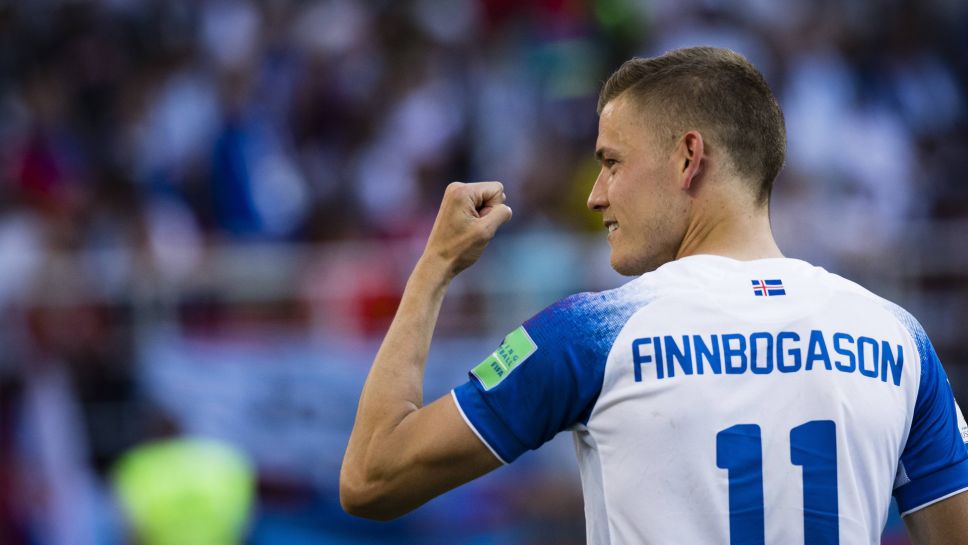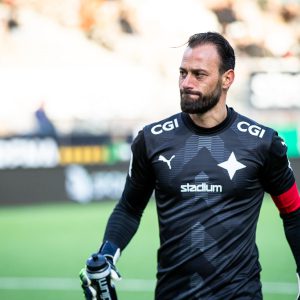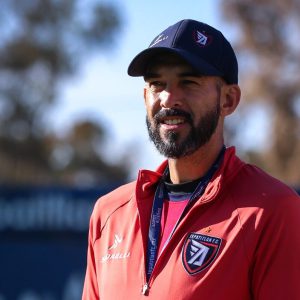

“If we tried to play like Barcelona, we would lose every game”
Currently playing for FC Augsburg, Alfred Finnbogason is an Icelandic international player with experience in countries such as Spain, Holland, Greece, Belgium, and Sweden. Throughout his career, the striker from Reykjavic has achieved 61 caps and has won a Greek League, an Icelandic League, a Belgian Cup, a Swedish Super Cup, and an Icelandic Cup. Read the full interview conducted by Nuno Milheiro below.
Despite experiencing sports such as handball, basketball, and athletics, Finnbogason’s passion for football prevailed. The first youth cap for the Iceland national team came only at the under-21 side.
Football was always my passion, from my first memories when I was about 5 or 6 years old. I was not a typical big talented player. For example, in the youth national teams under-16, 17, and 19, I did not play any match. I was also small when I was younger, so the first time I played for the Iceland national team was at the under 21 stage. We had a great team there, which is the core of the national team from the last 8 years. We went to the final tournament of under-21 in 2011. It was a great experience and gave us a lot of good memories and experiences for later big tournaments like the European Championship in 2016 and the World Cup in 2018. This group of players are together for a long time, so we know each other very well”, he said.
He started playing at a very young age as a striker, and his mission to score goals remains active. “That was my destiny, I think. I was always a striker, and it was all about goals. Many say that it is a natural talent or something. Now I am 31, and my life is still about scoring goals”.
Eidur Gudjohnsen, an indispensable name of Icelandic football, was one of his greatest inspirations. “He grew up in Iceland and worked hard to get where he was. He was a super talent very young, goes to PSV Eindhoven, and then had a big injury. People thought his career was over, and he went back, and in a short time, he was all of a sudden in Chelsea and winning the Champions League with Barcelona. I think that inspires you. I grew up playing with a very talented group of players in my under 15 and 16 teams and saw that three of them got sold, two to England and one to Holland. At that time, I thought “if it is possible for them if I perform a little bit better and focus a little bit more, this can also happen to me very quickly”. Inspirations are all around you”.
It was at the age of 18 that Finnbogason progressively started realizing that he could play in one of the top five leagues. “I was quite a late developer. In my 15, 16, or 17s I was just doing my studies and training with a team in Iceland. When I was 18 or 19, I started to make some changes in my life and put my priority on football. I started playing in the first league in Iceland at 20 years old and left the country at 21 to Belgium. Then I understood I had some potential, but still far away from a top-league level. So, I had to make my steps on the way to play in Spain and Bundesliga. In my career, everything happened for a reason. Everywhere I have learned something and taken it with me for my later steps”.
In the 2010-2011 season, the adaptation to the Belgian context was not easy, despite having experienced an initial period of success in Lokeren.
I needed to make a lot of adjustments. You can live a certain lifestyle in Iceland and be successful since the competition is not as hard as in the top leagues. When I came to Belgium, I started very well and thought “let’s continue like this!”. Unfortunately, I could not keep up the momentum. I was not feeling good, and I was not able to keep the performances I had shown in the beginning. So I had to learn from the early stages of my professional career that it would not always be easy. If you are not sharp in training and the games, there is someone else waiting to take your spot.”
There is a set of qualities that he believes that all players should bring together when they embrace a new challenge outside their home country. “The most important is the mentality that you go in with. You have to be able to learn a new language so that you can communicate. It does not matter where you go. You are a guest in a country, so it is up to you to adapt to the country and not the other way around. For example, when I go to Real Sociedad, in 23 players, 22 of them were from Spain and one from Argentina. So it was up to me to learn Spanish very quickly so I can communicate with them and be part of the team. Another quality is adaptability. You have to be flexible and be adaptable for moving to other countries because that is the life of a professional football player. You also need to have an open mind. Living in different countries is a great experience, and you will always take something with you for your life.”
After a loan at Helsingborgs IF, Finnbogason caught the attention of Real Sociedad after scoring a total of 59 goals in 70 matches at Heerenveen during the 2012-2013 and 2013-2014 seasons. However, his adventure in the Spanish club did not go as expected. “Everybody knows that a football career is not only just fun. You have periods where it is not going so well, and this is nothing I am ashamed of. I am the first to admit that it did not go as I expected and also did not go as the club expected. I am not looking for an excuse, but more like a reason why it did not work out. I had a small injury at the beginning and maybe started playing a bit too soon. I was putting a lot of pressure on myself to come back and help the team. The team started the season badly, so the coach left after five games, I think. The new coach did not have any extra pressure to put me on the pitch, because for him all the players were new. Normally, when you are new on a team, you get more games to get yourself into things. I think, as a striker, the longer I wait for my first goal things get more difficult. There were some difficult months, but they also helped me grow for future steps because after that I was really hungry to succeed. I had the pleasure of playing with a lot of great players in Sociedad, so there was a lot of competition to play. In general, I try to look at the positive things from that year.”
Currently, he does not hide his happiness at playing in the Bundesliga at FC Augsburg and plans to remain in Germany for the next few years. “I am very happy with the chance to play in a top league like Bundesliga, in Augsburg. They tried to sign me a few years earlier, so I was always in contact with the club. I needed some stability in my career at that point. Augsburg is not a big town in Germany, it has 300.000 people, but it is as big as Iceland. That puts you a little bit into perspective. I can see myself in Germany for the next few years because I and my family are very happy and settled here”.
From a competitive point of view, Finnbogason ensures that the Bundesliga can compete with the Premier League. “All leagues have their cycles. A few years ago, when Bayern Munich and Borussia Dortmund played the Champions League final, the Bundesliga was at a high level. The money in England is something that always tempts players. They have more ability to get the best from the Bundesliga, so you see that players in Dortmund or Bayern are being bought. And now, this year, we had RB Leipzig and Bayern Munich in the semifinals of the Champions League. Bayern Munich convincingly won the trophy, and I think that shows the quality of the Bundesliga. Also Monchengladbach, Bayer Leverkusen… It is difficult to compete with the top clubs in England, but German clubs are trying to find other ways to sign younger players and let them play. That also makes the league very exciting”.
Finnbogason has played in countries whose differences in playing style are undeniable. “Eredivisie is the perfect league for younger players to develop, especially attacking players, because there is a lot of focus on the offensive and technical part. Everybody plays in a similar system: 4-3-3. Going to La Liga was a huge step for me because there every player is at a very high technical level, even higher than in Bundesliga or Premier League. In Bundesliga, there is the highest fitness level, because there is a lot of demand for running, duels, and sprints. There is also more counterattacking football, with going back and forth all the time. All of them have their specific details, and there is also a difference if you are playing for a top, a middle, or a bottom team, of course”.
The improvement of infrastructures was decisive in Icelandic football, enabling regular presence in international competitions.
Before we were playing outside in the winter on hard pitches, snowing, windy… Everybody knows that in these conditions you cannot get much quality out of the training. We had a lot of mentality players, as we say. Now, we have a mix of the Icelandic mentality and technically better players. But, in the end, I think what people talk about regarding Icelandic players is the mentality and desire to be successful. In the coming years, that will also be the most important factor”.
The preservation of their own identity was another factor that contributed to the success of the Iceland international team. “It is better to have your own identity and be criticized for that than to be a bad copy of Barcelona or Brazil. If we tried to play like Barcelona, we would lose every game, because we do not have the players for it. We know our strengths. Every player that comes to the team knows the tactic, the guidelines, and the principles. From many people, we get criticism for not being offensive enough or playing too passive, but this is our best way to get results. It does not matter in the end what people say. The results speak from themselves”.
Finnbogason agrees that, although Scandinavian countries produce world-class strikers, center backs, midfielders, goalkeepers, and even full-backs, in recent years wingers have not stood out and pointed out several reasons.
“I think it is a mix of many things. For example, street football is not something you see many times. It does help if you play on different kinds of surfaces. Sometimes on the beach, sometimes on the grass. That is why you get different players from Brazil and Norway. There is a completely different base, philosophy, and focus. It also has a lot to do with training. I think it happens for a reason. Every once in a while, you get big players who are different from the others”.
We will not see many Scandinavian players playing in South America. There is so much talent there that they do not need the Scandinavian flavor. Well, we have some exceptions in Portugal who had a lot of success there, such as Victor Lindelöf. But, in general, in Spain also, Scandinavian have tried, and it is not being easy if you take out Henrik Larsson and Eidur Gudjohnsen. Many times you have to be a bit better than the local players to play because they always look first at their academy and young players before looking abroad. You also have cultural differences, no doubt about it. Scandinavian players suit well in Germany, in England, and there are also Swedish players in Italy. If a club has a lot of success with a certain nationality, for example, Brazilians, they tend to look more to Brazilians. You need one or two Scandinavians to start the wave in other countries. If they are successful it opens places for other players”, he concluded.
Get to know more about Soccer HUB!
Follow us on Facebook!
Categories
Latest Courses
-
9 Lessons
-
1 Lesson
-
6 Lessons
You May Also Like
- Blog
- August 1, 2022
- Blog
- June 3, 2022
- Blog
- May 27, 2022
Developed by Brandit Digital Media Services.





